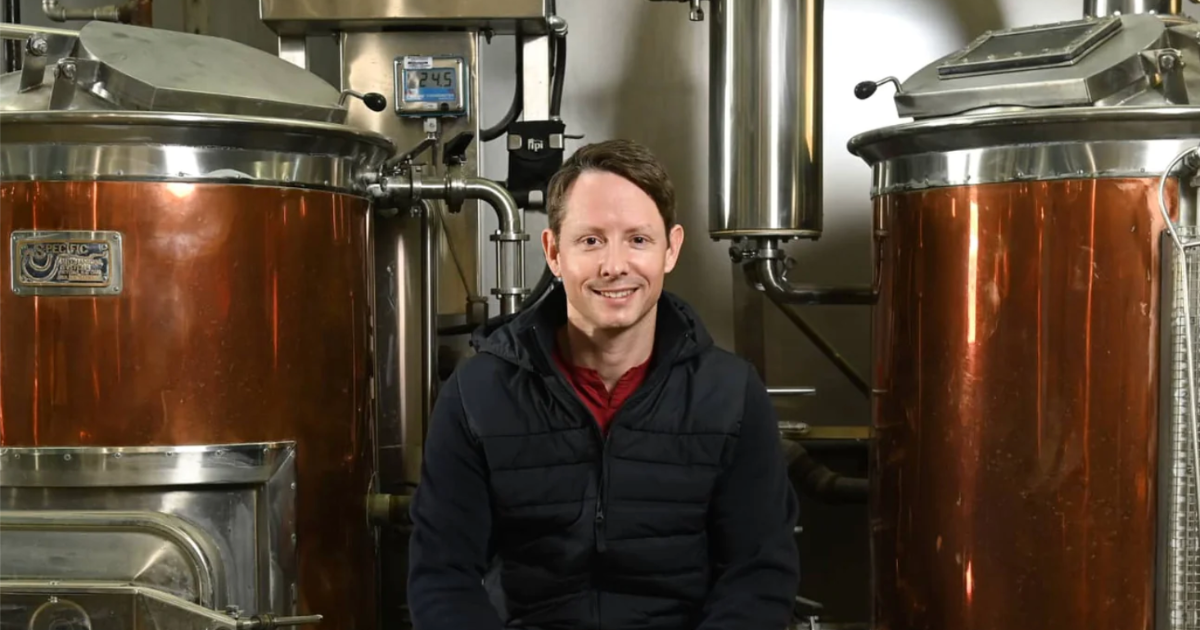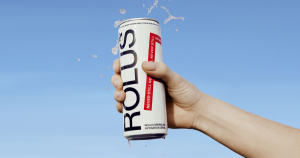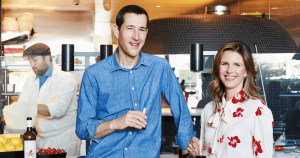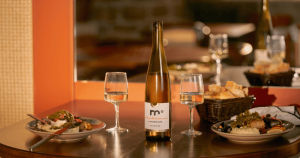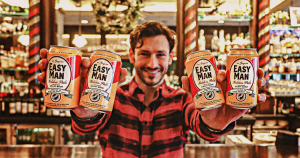Partner Content: Partake Brewing
From pioneering North America’s first non-alc e-commerce platform to building his own brand, Ted Fleming shares his compelling journey into the non-alc beer space—which began long before it soared in popularity. Diagnosed with Crohn’s disease in 2005 and entering fatherhood in 2010, Ted’s life trajectory led him to forgo alcohol. That sparked not just a personal transformation but a professional one as well.
Confronting a lack of suitable non-alc options in social settings, Ted launched Partake Brewing, which is now one of the largest craft players in the space, available at retailers like Target, Whole Foods, and Total Wine. Ted’s story is a testament to innovation and perseverance, overcoming skepticism from traditional brewers and the challenges of exceeding consumer expectations. Yet his commitment to quality and community has uniquely positioned Partake in an increasingly crowded market. This interview explores Ted’s founder journey, how Partake remains a cut above in the expanding non-alc beer world, and his thoughts on the future of social drinking.
Ted, you started your career in the energy sector, of all places. Then you dove into the non-alc space with North America’s first non-alc e-commerce platform: PremiumNearBeer.com. Tell us what drew you to the space back in 2013—before it had become popular?
My journey actually started a few years prior. In 2005, I was diagnosed with Crohn’s disease and in 2010, I became a dad for the first time. For both of those reasons, I decided I needed to make some bigger changes in my life. Giving up alcohol was one of them, which was difficult because there wasn’t really much in the way of non-alc brands. Even on the beer side, there was very little choice. In a restaurant or bar situation, it was a disaster, really.
When I’d go out with friends—who were all ordering local craft beers—I’d say, “hey, what do you have that’s non-alc?” If I was lucky, I’d get a Shirley Temple. One question stuck with me: why can’t I have a good craft beer with my friends in this situation? That was one of those little nudges, those little things that I kept in the back of my mind as a motivator to start Premium Near Beer and then eventually Partake.
Premium Near Beer was a way for me to solve my own problem of not being able to find good alternatives in the beer space. It was my early attempt at solving the problem I had as an individual. As it turned out, it was a problem shared by many, many others.
After Premium Near Beer, you went on to establish your own non-alcoholic beer brand and quickly garnered a lot of awards. You were even featured on Dragon’s Den, which is similar to Shark Tank. Tell us about those whirlwind first few years. Was Partake an immediate success out of the gate? Or was it a lot of trial and error in those early days?
Even before the product was launched, I already had a great channel and community in Premium Near Beer. It was actually that community that was pressing me, “Ted, can you get craft non-alcoholic beer?”
I went out to some breweries that were in my area and said, “hey, I’ve got this great channel. I’ve got this super passionate community. I think this will work as a product. Will you help me make it?” I got laughed out of so many breweries who just said, “no, it’s not going to work, there’s no market for it.” I even had one person say it was the dumbest idea they’d heard in a long time. These slights turned into motivators for me, but there was a lot of work ahead.
Dragon’s Den, for me, was a big risk. I only had a prototype product. I hadn’t sold any, actually, at that point. But one of the judges had a beer background and she gave our IPA a glowing review. That was a positive motivator for me. I knew we were on the right track. I thought to myself, “keep going because you’re doing something that some of the biggest beer companies in the world haven’t quite cracked yet.”
Why do you think you were able to crack the code when the larger companies hadn’t? Since those early days, has there been any innovation in how you produce your products?
There’s definitely been innovation since day one. More like incremental improvements—we’re never satisfied as a company with our product. It always could be better in some way, shape, or form, despite all the awards and the commercial success that we’ve had.
In the early days, we basically had no money. We had no brewery at the time. Those two things actually turned out to be what I call “beautiful constraints.” I was forced down a certain path that required me to be creative in terms of developing my production method. I also had that motivation from that personal connection to my community. I wanted to do something for them, as well as for myself. It was personal. That drove me to throw 20 or 30 batches of potential product down the drain before we got to something that I thought was actually quite good. Then I was able to get some government grants and some experienced brewers to help me refine the process and product.
Because I was the one of the earliest in the space and few had done it before, there were a lot of people who supported me. They understood that I was trying to do something unique and creative. There were lots of people that wanted to help for that reason.
In the years since you’ve launched, you’ve seen the non-alcoholic space explode, both other craft brands and the Heinekens and Guinnesses of the world getting into the space. Today, what would you say differentiates Partake within the non-alc beer market?
Still today, I think we have the best taste profile and calorie value proposition in the market. All of our beers are between 10 and 30 calories. We’ve won probably close to a dozen world beer awards and a whole bunch of other beer awards. But, as I like to remind my team, calorie count is not an award criterion in any of these competitions. We’re winning these awards purely based on taste. And we happen to do that in this ultra-low calorie format, which is amazing.
In terms of our ethos and what non-alc beer means to us, we’ve been at this for over seven years. I’ve been in the industry for 10 years. We continually refine our product, making it better year after year because we’re never satisfied. Some of the larger beer companies have simply made a non-alc version of their standard alcoholic beer, put a label on it, put it to market, done. Some of the non-alc brands produce at the same co-packer and haven’t innovated much on the liquid side. Besides our low calorie value proposition, our key point of differentiation is that we put in the time and effort on taste. That shows in the end product.
You recently launched your Pils variant, which has been really well received. How do you approach expanding your product line?
Early on, we took a lot of inspiration from the styles that worked in alcoholic craft beer. So IPA was our first, Pale was our second. Today, we have such a large audience that we’re able to listen to them. We have a direct line of communication with our consumer community, so we’re always able to test new products with them—even before we launch them more broadly. Now we take the market knowledge from craft beer and combine it with that direct feedback we get from our own audience.
Speaking of community, tell us about your partnership with The Association of Pickleball Players. Why did you decide to align Partake with the pickleball community?
It started when we asked ourselves, “what does Partake mean as a brand?”
We’re for people who are making the most of their lives. They’re out there trying to enjoy their life, trying to be fit, trying to have fun. They’re experimenting with new things. Given pickleball’s growth, but also its inclusive aspect—anyone can pick it up and have fun with it—it’s an obvious fit for us. That inclusivity was part of our beginnings as a brand, too. It’s in our name, Partake. It’s our origin story. I just wanted to have a beer with those friends, right? To be included.
Pickleball, we think, is a great analogy to that from a sporting perspective.
Love it. Now, back to the bevs themselves. You see some non-alcoholic beer brands venturing into other areas within non-alc. Is Partake going to be committed to the beer space forever, or are you looking at anything else?
There are lots of great ideas, lots of new products coming out in the non-alc space that I think are interesting. We’re in an interesting position having built the franchise we’ve built around Partake in the beer space. We’re still going to take our cues from our loyal consumer base in terms of what we do from an innovation perspective. Personally, I see a lot of exciting things that are tangential to beer, in parallel to non-alc beer.
Is there anything in the pipeline that you’re able to hint at?
I can’t reveal specifics, but there’s definitely some experimentation going on. We’ve got a pretty good cadence of new innovation. We’re probably launching four to six new styles a year, first through our super-loyal community, which we call our Partaker Club, and then through our e-commerce site.
If those sell out with our community, then we translate that to the retail side. That’s our process to launch something new: validate it within a smaller community, and then scale it.
Shifting now to the culture of drinking: obviously Partake has enjoyed the cultural shifts we’ve seen in North America toward moderation. What do you think the future of social drinking is going to look like?
Today, we see that flexible consumer who’s drinking alcohol on some occasions, drinking non-alc on others—making that choice to flex when it makes sense in their own situation.
We’re only at the tip of the iceberg in terms of overall society adopting that type of behavior. It just makes more and more sense for people. They’re loving that choice. There’s a lot more room for the industry to run based on that type of consumer behavior.
Partake Brewing crafts expertly brewed, low calorie, non-alcoholic beers that people are proud to drink anywhere. Explore their award-winning brews.


